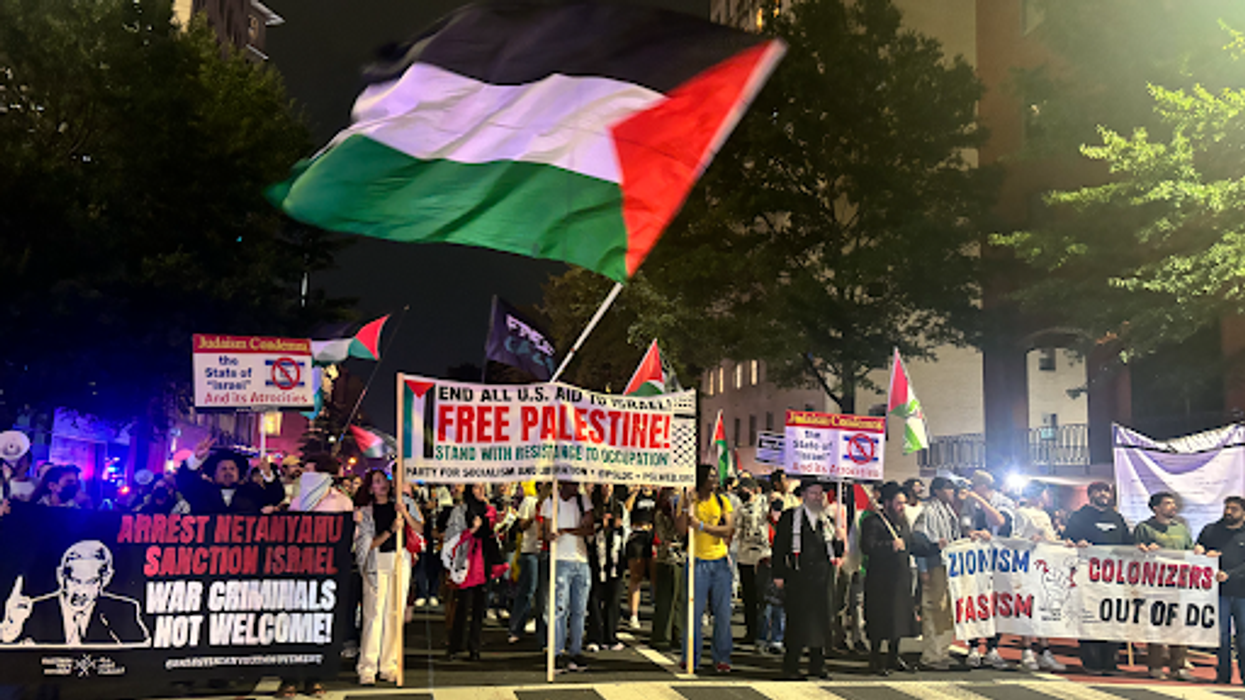Pro-Palestine protesters marched the streets of Washington, D.C. on Sept. 29 calling for an end to the Israel-Hamas war in Gaza, and condemning Israeli Prime Minister Benjamin Netanyahu’s visit with President Donald Trump.
The demonstration, organized by the Palestinian youth movement, drew roughly 300 attendees, including D.C. residents and representatives of the Jewish community. The three-hour protest, which began at 6 p.m., featured guest speakers and highlighted concerns about civilian suffering in Gaza and perceived U.S. support for Israeli policies.
“It’s a genocide, hurt people hurt people, and now they’re doing the same thing to the Palestinians,” said Robin Galbraith, a pro-Palestine protester. “It was good to see people leaving the U.N., but this administration still supports those who continue this.”
Patti Mohr, another protester, said she attended in reaction to Netanyahu’s visit.
“This is his [Netanyahu’s] fourth time here. I know that Trump announced his 20-point plan and a lot of countries have supported Trump on this,” Mohr said. “I’ve been to Israel and been to the West Bank, I’ve saw what they live through and to hear what its like to live without freedom.”
Mohr added, “It is because of our country that it’s happening. We’ve vetoed six resolutions in the Security Council, and we’ve given them so much money.”
The protest began on H Street and marched toward 17th Street near the Blair House, where Netanyahu was reportedly staying. Police presence was heavy, though the National Guard was present. Several streets were blocked, and the area around the White House was barricaded with tall gates in response to Netanyahu’s visit.
Representatives of Neturei Karta International, a Jewish community opposing Zionism, were also present. They held signs reading “Judaism demands freedom for Gaza and all Palestine” and “Authentic rabbis always opposed Zionism and the State of Israel.”
Representatives of the Neturei Karta International group at the Pro-Palestine protest in Washington D.C. on Sept. 30, 2025. Photo by Bridget Erin Craig/UPI
In an interview with UPI, Rabbi Yisroel Dovid Weiss, a longtime critic of Zionism, emphasized the religious and historical roots of his opposition.
“While Zionism was a movement of non-religious Jews, it was simply a transformation into a selfish, flawed goal to have a piece of land and not care about the Palestinian people,” Weiss said.
Weiss walked around sharing a booklet of historical photos documenting peaceful interactions between Jews and Palestinians, such as communities protecting each other’s places of worship and sheltering refugees.
“We have seen the culmination of what’s happening in Gaza.” Weiss said as he turned through the booklet. “We work with the people of Gaza, and we plead with world leaders.”
The protest briefly drew attention from The Fearless Tour, a conservative group that hosts debates on college campuses. They arrived with a sign reading “$100 if you can prove Israel is apartheid. Let’s talk,” and played songs including YMCA and God Bless the U.S.A. on a large speaker.
Fearless Debates commentators at the Pro-Palestine protest in Washington D.C. on Sept. 30, 2025. Photo by Bridget Erin Craig/UPI
Cam Higby, one of the Fearless Debates commentators, said “We started it to basically show the left that we’re not afraid to have discourse with people in the face of political violence … We hope to continue inspiring conversation among Americans left, right, and center.”
After their stop at University of Maryland on Sept. 29, they happened to be in Washington D.C. and showed up to the protest. In response to the premise of the protest, Higby said “It’s not genocide. When somebody attacks you, just like when Al-Qaeda attacked us on 9/11, you have a right to retaliate. People die in war. It’s unfortunate.”
Tensions between protesters and the conservative group were brief, with police stepping in to separate the two sides.
As the protest attendees began to disperse, Weiss shared his intentions for Neturei Karta’s presence. “We urge people, whatever you can, as much as you can, stand up… like apartheid, it was the grassroots who brought about the uncomfortableness of governments and brought an end to it,” he said.
Looking towards the future, Weiss added “One day, this will urge everybody: do what you can, be on the right side of history, and we hope and pray it should happen soon in our days.”
The protest ended after three hours.
Bridget Erin Craig is a recent graduate of Northwestern University's Medill School of Journalism, specializing in politics, policy, and foreign affairs.




















Trump & Hegseth gave Mark Kelly a huge 2028 gift